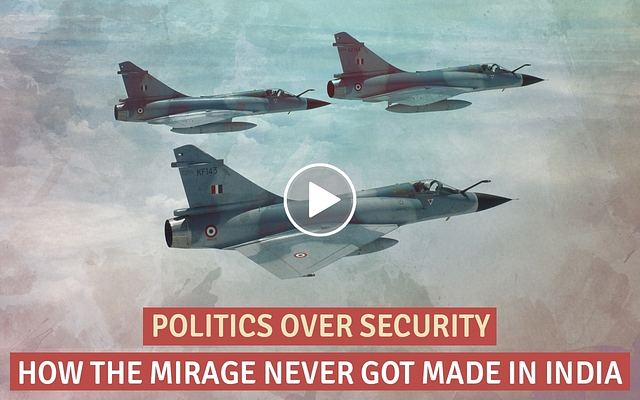
[Watch] The Mirage Could Have Been Made In India – But Politics Got In The Way
Transcript:
India’s strike on the Jaish-e-Mohammad camp in Pakistan involved a curious machine with a slightly complicated Indian past – the machine we’re talking about was the one that also turned the 1999 Kargil conflict decisively in India’s favour.
We’re talking about the French Dassault Mirage 2000. Here in India, we call it the “Vajra”.
Now, what’s curious about this machine? It’s that, though the Indian Air Force has been a big fan of the aircraft, often talking about its merits and its proven reliability and effectiveness, successive Indian governments have been happy to hang back and simply look to purchase the Mirage 2000 off the shelf rather than look to licence-build it here.
This goes back to the ‘80s. In 1984, the then Congress government placed an order for 40 Mirage 2000 aircraft – mainly to counter the then US sale of F16s to Pakistan – along with an option to produce another 110 Mirage by the HAL in India.
But the production part of France’s offer to India didn’t go through because at that time, the Soviet Union was also talking to Indira Gandhi about their Mig-29. Gandhi was then soon convinced by the Soviets to go ahead with the purchase of Mig-29s, and eventually the Mirage 2000 production deal was turned down.
What’s interesting here is that the French offer to India for building the Mirage stood for 22 years, across several governments, both Congress and the NDA – that’s a long time.
In fact, after the 1999 Kargil conflict, the IAF was so keen about getting the Mirages that they were even ready to settle for the older variant, the Mirage 2000-H. But the IAF had no luck. And the opportunity continued to be squandered up until 2006, after which the French pitched a new deal in the form of Rafale, over which much noise is made now.
Imagine if we had gone in with the French offer to get the Mirage built in India – much of the inventory problem that we are facing today with our fighter aircraft could have been resolved – maybe not greatly, but to a meaningful extent.
As many senior officers point out, India has a large variety of fighter aircraft in its inventory today – all the different Migs, the Jaguars, the Sukhois, the Tejas – and though this might seem like an advantage on the face of it, this has actually created challenges for the air force in terms of maintenance, logistics, training, and whatnot.
And probably in September you will see the first of the Rafales joining this sprawling mix.
If only politics took a back seat in the matters of defence manufacturing and acquisitions, the Indian defence arsenal would so much more in sync with the needs of the army, airforce and navy.
But with all the squabbling around Rafale, it doesn’t look like that’s going to happen any time soon, and our defence would be the poorer for it.
Next, Watch: With Air Strike On JeM Camp, India Is Changing How It Will Operate With Pakistan